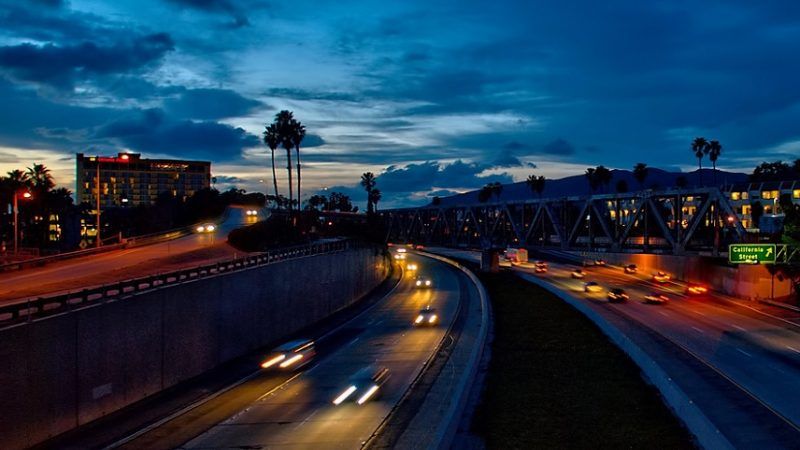Proposed California Car Ban a Perfect Mix of Hubris and Silliness
Seeks to ban registration of vehicles that aren't zero emissions, in 2040.

It's about time that members of Congress and the California legislature got really serious about combating the nation's pollution problem. Just as Jonathan Swift had a "modest proposal" to keep poor Irish children from being a burden to their families and their country (by selling them to wealthy English people as food), I, too, have a modest proposal for dealing with the unconscionable level of pollutants that are emitted in the U.S. to produce electricity. Let's propose a plan to shut down the nation's power plants.
The facts are unmistakable: An environmental group in 2009 reported that the "nation's power plants emitted 2.56 billion tons of global warming pollution… which is equivalent to the pollution from nearly 450 million of today's cars—nearly three times the number of cars registered in the United States in 2007." Even cleaner natural-gas fired plants, which have become more prevalent in ensuing years, "release 21—120 times more methane than earlier estimates," according to a summary of a Purdue University/Environmental Defense Fund report from last year.
Do you care about clear air, the health of our children and the future of the planet? Of course you do. So there's little reason to complain about this idea. Before you chalk it up to one columnist's silliness, consider that some California policy makers are proposing something equally "modest" and ludicrous. Yet they seem totally serious about it.
Assemblyman Phil Ting (D-San Francisco) and some other Assembly members have introduced legislation that would ban the registration of passenger vehicles that are not "zero emissions." Assembly Bill 1745 would, beginning in 2040, prohibit the California Department of Motor Vehicles "from accepting an application for original registration of a motor vehicle unless the vehicle is a zero emissions vehicle."
Likewise, California Air Resources Board chairwoman Mary Nichols told Bloomberg in an interview that Gov. Jerry Brown (D) "has expressed an interest in barring the sale of vehicles powered by internal-combustion engines." The governor reportedly wondered why China is able to do this and lawmakers haven't considered it in California. So now California's legislature is indeed considering something that would, according to the article, "send shockwaves through the global car industry due to the heft of California's auto market."
Shockwaves for such a modest proposal? It's not as if the underlying concept—banning stuff that our political leaders don't like—is anything new. As a colleague noted, perhaps California lawmakers ought to simply ban the production and sale of meat-based products, also, given the ill effects of slaughterhouses on the environment, our diets, and on the quality of life of the animals that end up on our dinner tables. We've got to think out of the box.
The bill would exempt large commercial vehicles and cars brought to California from other states. Perhaps legislators aren't thinking big enough. Sure, this column has a mocking tone and hasn't dealt with the actual arguments in favor of a ban on gasoline- and diesel-powered vehicles, but there really aren't any serious arguments for doing this. The apparent goal is to reduce pollution, but the real goal may be about making a moral statement and grabbing headlines.
Journalist H.L. Mencken wrote that politics is about keeping people alarmed "with an endless series of hobgoblins, all of them imaginary." That's a bit overstated, sure. Pollution remains a serious problem, but it's best handled through market advancements, not by allowing politicians to scare us into embracing fake "solutions."
It's reality time. California is not going to get rid of polluting vehicles—or power plants, for that matter—by banning them. It would mostly harm the poor, who cannot afford the pricey new electric vehicles. But maybe they can consider selling their children to help afford the latest Tesla. EVs are great advancements, but even though they have no tailpipe, they will increase our reliance on power plants. Hence, the importance of my modest proposal to go along with the one pitched by legislators and Brown.
But there I go foolishly giving these proposals more serious analysis than they deserve. There's an old libertarian maxim about political crises and solutions. To be really effective at what Mencken describes above, a politician needs to propose something that isn't imminent, but could possibly take place a couple of decades into the future. It has to be far enough away that it won't affect anyone's lives, but close enough to justify "doing something."
The proposed ban fits that perfectly. The automotive industry is advancing so rapidly that it's impossible to predict what it will look like in 22 years. By the time a law would go into effect, few of us might even drive cars. We might be leasing autonomous vehicles. The bill is hubris. So if we're going to posture, we should do it right—and pass bans on power plants, slaughterhouses and any other bad thing we can think of, also.
This column was first published in the Orange County Register.


Show Comments (112)